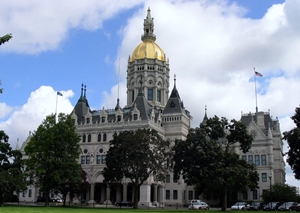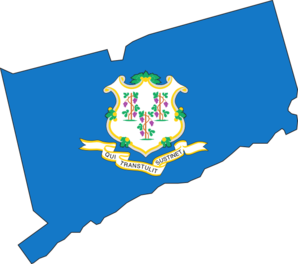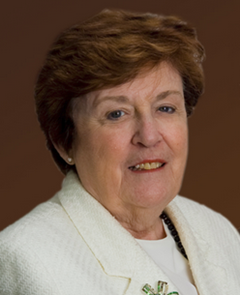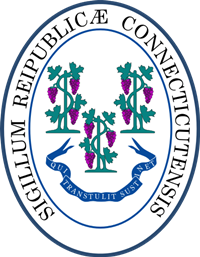The Connecticut General Assembly adjourned the 2017 regular session Wednesday, June 7, 2017. Lawmakers will have to return for a special session after failing to reach an agreement on a two-year state budget. For the second year in a row, […]
 The Connecticut General Assembly adjourned the 2017 regular session Wednesday, June 7, 2017. Lawmakers will have to return for a special session after failing to reach an agreement on a two-year state budget.
The Connecticut General Assembly adjourned the 2017 regular session Wednesday, June 7, 2017. Lawmakers will have to return for a special session after failing to reach an agreement on a two-year state budget.
For the second year in a row, Gov. Dannel Malloy declined to give the traditional after-session speech to members due to the Assembly not completing its work by the midnight deadline.
A budget must be finalized by June 30. Other legislation left hanging in the balance includes a bill to allow Tesla to build a dealership in the state and a proposed constitutional amendment to protect state parks.
March 14, 2017 •
Special Elections Announced for Connecticut House Vacancies
Two special elections will take place on April 25, 2017, to fill vacancies in the Connecticut House of Representatives. Gov. Dannel Malloy announced the elections for Assembly Districts 7 and 68 after the incumbents, Rep. Doug McCrory and Rep. Eric […]
 Two special elections will take place on April 25, 2017, to fill vacancies in the Connecticut House of Representatives.
Two special elections will take place on April 25, 2017, to fill vacancies in the Connecticut House of Representatives.
Gov. Dannel Malloy announced the elections for Assembly Districts 7 and 68 after the incumbents, Rep. Doug McCrory and Rep. Eric Berthel, won seats in the Senate during a special election on February 28.
District 7 consists of portions of Hartford, while District 68 contains Waterbury and part of Woodbury.
January 17, 2017 •
A Special Election will be Held Next Month for Connecticut General Assembly Openings
A special election will be held February 28, 2017, to fill General Assembly vacancies. Seats for Senate Districts 2 and 32 as well as House District 115 were vacated when the legislators resigned to take other positions within state government. […]
 A special election will be held February 28, 2017, to fill General Assembly vacancies.
A special election will be held February 28, 2017, to fill General Assembly vacancies.
Seats for Senate Districts 2 and 32 as well as House District 115 were vacated when the legislators resigned to take other positions within state government.
Sen. Eric Coleman resigned to seek a state judgeship, Sen. Rob Kane hopes to be appointed state auditor, and Rep. Steven Dargan will serve on the Board of Pardons and Paroles. All three lawmakers won re-election in November.
October 24, 2016 •
Special Election to Fill Connecticut House Seat Set for Same Day as General
A special election will be held on November 8, 2016, to fill the state’s 90th House District seat. Rep. Mary Fritz, who held the seat for three decades, died in July. The winner of the special election will finish Fritz’s […]
 A special election will be held on November 8, 2016, to fill the state’s 90th House District seat. Rep. Mary Fritz, who held the seat for three decades, died in July.
A special election will be held on November 8, 2016, to fill the state’s 90th House District seat. Rep. Mary Fritz, who held the seat for three decades, died in July.
The winner of the special election will finish Fritz’s term, and the winner of the general election, held the same day, will serve the next term beginning in January.
Photo of Rep. Mary Fritz courtesy of the Connecticut House Democrats website.
September 26, 2016 •
Connecticut Lawmakers to Meet to Approve Deal with Helicopter Manufacturer
Gov. Dannel Malloy has summoned lawmakers back into a special session beginning Wednesday, September 28, 2016, to approve a deal with Sikorsky Aircraft. The tentative agreement, worth $220 million in grants and tax exemptions, will keep the company in the […]
 Gov. Dannel Malloy has summoned lawmakers back into a special session beginning Wednesday, September 28, 2016, to approve a deal with Sikorsky Aircraft.
Gov. Dannel Malloy has summoned lawmakers back into a special session beginning Wednesday, September 28, 2016, to approve a deal with Sikorsky Aircraft.
The tentative agreement, worth $220 million in grants and tax exemptions, will keep the company in the state for the next 14 years.
Sikorsky has also committed to growing its Connecticut workforce to 8,000 individuals, and they will build nearly 200 CH-53K King Stallion heavy-lift helicopters in-state.
Photo of the Connecticut State Capitol by jglazer75 on Wikimedia Commons.
August 10, 2016 •
Connecticut Gov. Wants to Cut Budgets Amid Investigations
Gov. Dannel Malloy’s administration announced they are cutting the budgets for the state’s watchdog agencies. The Office of State Ethics, the Freedom of Information Commission, and the State Elections Enforcement Commission will be subject to shrinking budgets at a time […]
 Gov. Dannel Malloy’s administration announced they are cutting the budgets for the state’s watchdog agencies. The Office of State Ethics, the Freedom of Information Commission, and the State Elections Enforcement Commission will be subject to shrinking budgets at a time when the governor’s office is facing investigations from two of the agencies.
Gov. Dannel Malloy’s administration announced they are cutting the budgets for the state’s watchdog agencies. The Office of State Ethics, the Freedom of Information Commission, and the State Elections Enforcement Commission will be subject to shrinking budgets at a time when the governor’s office is facing investigations from two of the agencies.
Just months ago, Malloy’s administration stated the agencies would not face cuts, but reversed its position soon after the Office of State Ethics voted to investigate the administration’s hiring of a former lobbyist to lead the regulatory review of a former client’s proposed merger. The timing has led to talk of the cuts being a form of retribution.
The State Elections Enforcement Commission also just levied a $325,000 penalty against Malloy’s state Democratic Party for pay-to-play violations, the subject of a new federal grand jury investigation. Heads of the agencies argue, however, the cuts are illegal under a 2004 law meant to prevent unilateral action by the governor.
A veto session is scheduled to convene next week; however, lawmakers in the Senate have already decided not to challenge Gov. Dannel Malloy’s line-item veto cutting more than $20 million in municipal aid. Democratic leadership in the House will instead […]
 A veto session is scheduled to convene next week; however, lawmakers in the Senate have already decided not to challenge Gov. Dannel Malloy’s line-item veto cutting more than $20 million in municipal aid.
A veto session is scheduled to convene next week; however, lawmakers in the Senate have already decided not to challenge Gov. Dannel Malloy’s line-item veto cutting more than $20 million in municipal aid.
Democratic leadership in the House will instead hold a closed-door caucus during the June 20 session. An override of the veto needed to start in the Senate because the budget bill originated there.
Most lawmakers are unhappy with the cuts, but Democrats, who control both houses, have chosen not to fight this particular battle with the governor.
The Connecticut General Assembly adjourned its regular session yesterday, May 4, 2016, without reaching a deal on the state budget. As time ran out on the session, constitutionally mandated to end at midnight, Democratic leaders postponed a vote on the […]
 The Connecticut General Assembly adjourned its regular session yesterday, May 4, 2016, without reaching a deal on the state budget.
The Connecticut General Assembly adjourned its regular session yesterday, May 4, 2016, without reaching a deal on the state budget.
As time ran out on the session, constitutionally mandated to end at midnight, Democratic leaders postponed a vote on the budget and will return next week for a special session. The Senate announced the special session will begin on May 12.
December 8, 2015 •
Connecticut Governor to Call Special Session
Gov. Dannel Malloy announced he will be calling the General Assembly into special session after reaching a tentative deal with fellow Democrats on the state’s budget deficits. The session will begin December 8, 2015. While the governor and Democrats have, […]
 Gov. Dannel Malloy announced he will be calling the General Assembly into special session after reaching a tentative deal with fellow Democrats on the state’s budget deficits. The session will begin December 8, 2015.
Gov. Dannel Malloy announced he will be calling the General Assembly into special session after reaching a tentative deal with fellow Democrats on the state’s budget deficits. The session will begin December 8, 2015.
While the governor and Democrats have, for the most part, come to an agreement, Republican members of the legislature are not yet on board. It is unclear whether the lack of bipartisan support will hamper passage of any bill introduced.
Photo of the Connecticut State Capitol courtesy of Ragesoss on Wikipedia.
July 20, 2015 •
Connecticut Lawmakers Return for One-Day Veto Session
Lawmakers returned Monday, July 20, 2015 for a one-day, constitutionally mandated session to consider overrides of the governor’s vetoes. Democratic majority leaders of both chambers announced there was not enough support for any such override, stating it would be best […]
 Lawmakers returned Monday, July 20, 2015 for a one-day, constitutionally mandated session to consider overrides of the governor’s vetoes.
Lawmakers returned Monday, July 20, 2015 for a one-day, constitutionally mandated session to consider overrides of the governor’s vetoes.
Democratic majority leaders of both chambers announced there was not enough support for any such override, stating it would be best to revisit any points of contention during the next regular session.
Photo of the Connecticut State Capitol by jglazer75 on Wikimedia Commons.
June 29, 2015 •
Connecticut General Assembly to Convene Special Session
The General Assembly will convene a special session today, June 29, 2015, to complete work on the state budget and other unfinished bills from the regular session. Lawmakers will also address reforms to the prison and parole system as well […]
 The General Assembly will convene a special session today, June 29, 2015, to complete work on the state budget and other unfinished bills from the regular session.
The General Assembly will convene a special session today, June 29, 2015, to complete work on the state budget and other unfinished bills from the regular session.
Lawmakers will also address reforms to the prison and parole system as well as a bill dealing with excessive use of force by law enforcement.
Legislative leaders hope to wrap up the session in one day.
June 4, 2015 •
Connecticut Legislature Adjourns; Special Session Likely
The General Assembly adjourned sine die on June 3, 2015, shortly before its midnight deadline. Both chambers voted to return for a special session, however, to finish work on bills related to the budget. A date for the special session […]
 The General Assembly adjourned sine die on June 3, 2015, shortly before its midnight deadline.
The General Assembly adjourned sine die on June 3, 2015, shortly before its midnight deadline.
Both chambers voted to return for a special session, however, to finish work on bills related to the budget.
A date for the special session has not yet been set.
May 28, 2015 •
Connecticut Governor Signs Ethics Bill
Gov. Dannel Malloy has signed a bill amending the code of ethics. Senate Bill 850, now known as Public Act 15-15, creates an additional exception to the definition of expenditure, adds to the list of who is not included in […]
 Gov. Dannel Malloy has signed a bill amending the code of ethics.
Gov. Dannel Malloy has signed a bill amending the code of ethics.
Senate Bill 850, now known as Public Act 15-15, creates an additional exception to the definition of expenditure, adds to the list of who is not included in the definition of a lobbyist, and raises the threshold for lobbyist registration from $2,000 to $3,000.
The new provisions are effective January 1, 2016.
The state’s legislature has agreed to a bill amending the code of ethics. Senate Bill 850, now known as Public Act 15-15, creates an additional exception to the definition of expenditure, adds to who is not included in the definition […]
 The state’s legislature has agreed to a bill amending the code of ethics.
The state’s legislature has agreed to a bill amending the code of ethics.
Senate Bill 850, now known as Public Act 15-15, creates an additional exception to the definition of expenditure, adds to who is not included in the definition of a lobbyist, and raises the threshold for lobbyist registration from $2,000 to $3,000.
After passing both chambers, the measure awaits the governor’s signature. If signed, the new provisions will be effective January 1, 2016.
Photo of the Connecticut State Capitol by jglazer75 on Wikimedia Commons.
State and Federal Communications, Inc. provides research and consulting services for government relations professionals on lobbying laws, procurement lobbying laws, political contribution laws in the United States and Canada. Learn more by visiting stateandfed.com.

